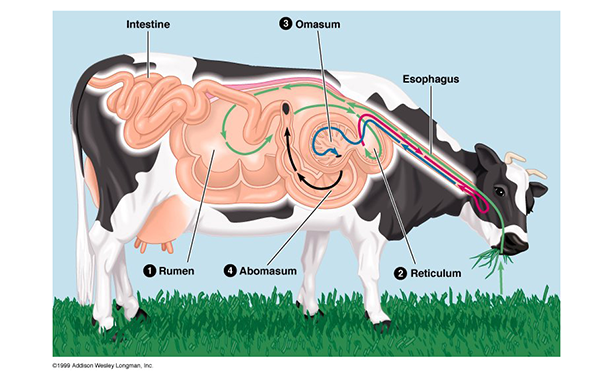
Sustainable livestock
by Tim Willmott : Comments Off on Sustainable livestock
From my Alma Mater comes this feature about how to cut the environmental and economic costs of keeping livestock, such as cows, goats and sheep, while boosting the quantity and quality of the food produced.
The strategies to make ruminant – cud-chewing – livestock a more sustainable part of the food supply, led by academics at the University of Bristol’s School of Veterinary Sciences, are outlined in a Comment piece in Nature .
The eight strategies include:
Feed animals less human food. Livestock consume an estimated one-third or more of the world’s cereal grain, which some advocate would be better used to feed people directly. Some of this could indeed be avoided by capitalising on ruminants’ ability to digest food that humans cannot eat, such as hay, silage and high-fibre crop residues.
Raise regionally appropriate animals. Working to boost yields from local breeds makes more sense in the long term than importing poorly adapted breeds that are successful elsewhere. European and North American Holstein dairy cows can produce 30 litres of milk a day. Thousands of these animals have been exported to Asia and Africa in an attempt to alleviate malnutrition. But exposed to hot climates, tropical diseases and sub-optimal housing, the cows produce much less milk, and the costs of feed and husbandry far exceed those of native breeds. Farmers, therefore, should be encouraged to keep and improve livestock adapted to local conditions.
Keep animals healthy. Human and livestock disease are generally treated as separate problems, but sick animals can make people sick. In low- and middle-income nations, 13 livestock-related zoonoses (diseases transferable between animals and humans) cause 2.4 billion cases of human illness and 2.2 million deaths each year. Animal management should include measures to control transmissible diseases, by improving hygiene, quarantining new arrivals on farms and establishing co-ordinated, sustained surveillance for diseases that cross the boundaries of species or countries.
Adopt smart supplements. Supplements can boost the productivity of ruminant animals by encouraging microbes in the rumen to grow quickly and provide the animals with better nutrition. Also, with some supplements, animals can produce more milk and meat for proportionally less greenhouse gas.
Eat quality not quantity. Raising animals for milk and meat is often considered at odds with the challenge of feeding a growing human population, but for undernourished communities there are health benefits to consuming healthy animal products. However, the goal of public health should be a balanced diet across all countries, with a target of no more than 300 grams of red meat per person per week.
Tailor practices to local culture. Close to one billion of the world’s poorest people rely on livestock for their livelihood. Traditional animal husbandry supplies more than just food. Keeping animals provides wealth, status and even dowry payments. However, the benefits of keeping animals are disrupted when conventional grazing and mixed-farming practices are replaced with industrial systems that prioritise short-term production. Policies to encourage high welfare, efficient management should consider cultural as well as natural factors.
Track costs and benefits. Despite ruminant livestock’s poor image as major greenhouse gas emitters,sustainably managed grazing can increase biodiversity, maintain ecosystem services and improve carbon capture by plants and soil. A cow produces up to 70 kg of manure per day, providing enough fertilizer in a year for one hectare of wheat, equivalent to 128 kg of synthetic nitrogen that might otherwise come from fossil fuels.
Study best practice. A global network of research farms — known as farm platforms — can evaluate the economic and environmental benefits of these and other farming practices, act as examples for local farmers to follow and provide valuable information for policymakers.
Professor Mark Eisler, Chair in Global Farm Animal Health in the School of Veterinary Sciences and Cabot Institute at the University of Bristol, said: “The quest for ‘intensification’ in livestock farming has thundered ahead with little regard for sustainability and overall efficiency, such as the net amount of food produced in relation to inputs from land and water.
“With animal protein set to remain part of the food supply, we must pursue sustainable intensification and figure out how to keep livestock in ways that work best for individuals, communities and the planet.”
Paper: Steps to sustainable livestock:With improved breeding and cultivation, animals can yield food that is better for people and the planet. Mark C. Eisler, Michael R. F. Lee, John F. Tarlton and Graeme B. Martin.
With John Beddington, Jennifer A. J. Dungait, Henry Greathead, Jianxin Liu, Stephen Mathew, Helen Miller, Tom Misselbrook, Phil Murray, Valil K. Vinod, Robert Van Saun and Michael Winter, Nature, Vol 507, 6 March 2014.
Further information
The Cabot Institute carries out fundamental and responsive research on risks and uncertainties in a changing environment. It drives new research in the interconnected areas of climate change, natural hazards, water and food security, low carbon energy, and future cities. Its research fuses rigorous statistical and numerical modelling with a deep understanding of social, environmental and engineered systems – past, present and future. It seeks to engage wider society by listening to, exploring with, and challenging its stakeholders to develop a shared response to 21st Century challenges.
Find out more about our work at www.bristol.ac.uk/cabot
School of Veterinary Sciences
University of Bristol
Langford House
Langford
Bristol
BS40 5DU






Comments are closed